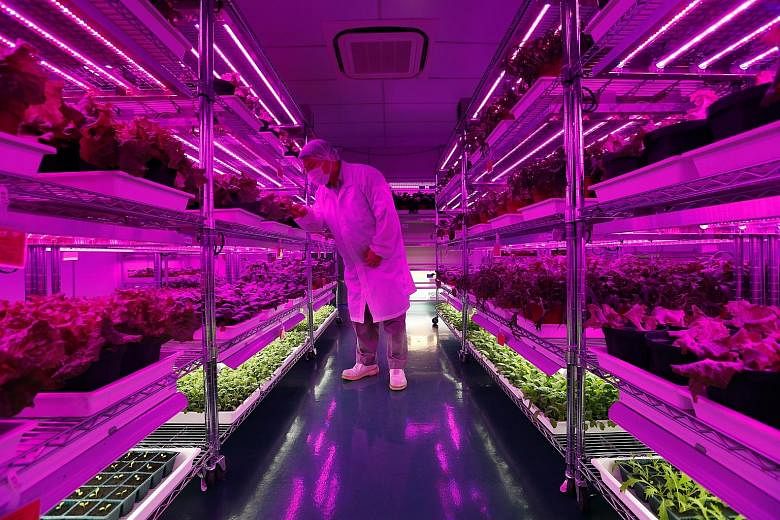Rearing fish and growing vege-tables could soon become more efficient and rewarding as Singapore pumps investments into research in these areas to boost food security.
A total of $23 million is going to 12 research projects on sustainable urban food production, the Singapore Food Agency (SFA) said in a statement yesterday.
Eight of the proposals are related to aquaculture, while four aim to study how vegetables can be grown more efficiently in an urban setting.
SFA chief executive Lim Kok Thai said the world is facing challenges impacting global food security. These include climate change, a growing global population and decreasing land available for agricultural use.
"Research and development holds the key to the future of food," said Mr Lim.
The research proposals span fields such as genetics, which involves selective breeding of bar-ramundi with better growth and fillet traits, and nutrition, which involves improving fish feed for red snappers.
The use of artificial intelligence and technology to improve farming is another area of research interest.
For instance, a proposal by researchers from the Nanyang Technological University and Panasonic Factory Solutions aims to find out how the real-time moni-toring of crop health and nutrient analysis can help to reduce waste and boost productivity in hydroponic cultivation.
Scientists from the Agency for Science, Technology and Research are also working with UVaxx, a company that develops vaccines for aquaculture use, to develop one against the scale drop disease virus in Asian seabass - the so-called "salmon of the tropics".
This disease is one of the most common in seabass. UVaxx general manager Markus Schrittwieser told The Straits Times: "Developing an efficacious vaccine against this viral disease would improve and increase production."
SFA's Mr Lim said the awarded proposals have shown innovation and practicality for application.
-
Vaccine for seabass in the works
-
Vaccinations do not protect just humans from disease. When deployed in aquaculture, vaccines can also prevent fish from falling ill.
This is what a research team from Singapore aims to do, as the country moves to boost local food production to improve food security.
One of the 12 research projects on sustainable urban food production, which the Singapore Food Agency yesterday announced it will be funding, aims to develop a vaccine against the scale drop disease virus in Asian seabass, which has been touted as the "salmon of the tropics".
The research proposal is an initiative of the Agency for Science, Technology and Research (A*Star) and UVaxx, a company that develops vaccines for use in aquaculture.
Associate Professor Ren Ee Chee, a principal investigator at A*Star's Singapore Immunology Network who is involved in the project, said scale drop disease is one of the most common diseases among seabass.
Infected fish show symptoms such as lethargy and severe scale loss, and the disease frequently results in the loss of 50 per cent to 100 per cent of an infected batch.
Prof Ren said: "Vaccinated fish can be healthier, grow to a larger size and can be harvested without significant loss."
UVaxx general manager Markus Schrittwieser said vaccination is key to a sustainable aquaculture industry. "If seabass are protected against all major threats, including scale drop disease, farmers can move on to the next level," he said.
UVaxx has a long history working with the biggest Asian seabass producers and has a team of experts dedicated to fish health management, vaccine production and disease diagnostics, he added. "UVaxx is able to translate and transfer high-end science out to the ordinary farmer."
Fang Yiyang
"I have every confidence that the outcomes of their research will bring us closer towards a more resilient, sustainable and vibrant agri-tech sector in Singapore," he added.
SFA said the 12 proposals included innovative ideas and solutions that take into consideration factors such as cost-effectiveness, resource use efficiency, sustainability and climate resilience. "The proposals also demonstrated good potential to be scaled up and applied in Singapore and other countries based on their track record, industry experience and research team," the agency added.
Singapore currently imports more than 90 per cent of its food.
It has set a target to boost local food production, with the aim of producing 30 per cent of its nutritional needs by 2030.


